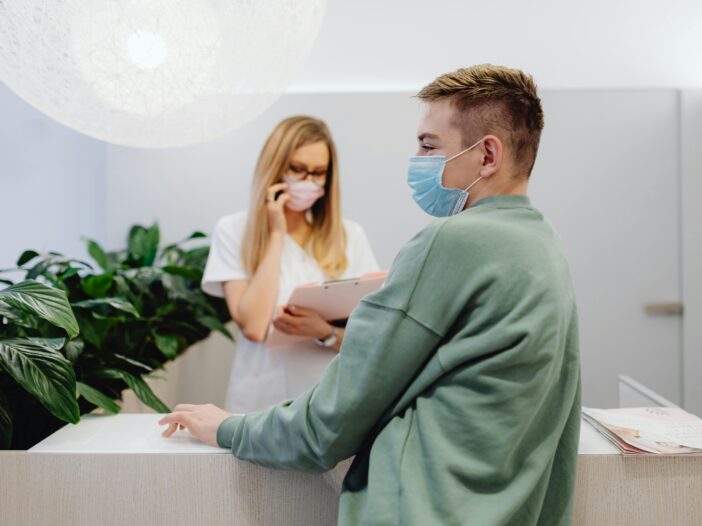
Some things are just better together. Like the quality patient care, treatment continuity and direct delivery of necessary medicines that IV infusions provide, with the cost-savings of 340B program discounts.
“One of our favorite strategies for improving patient care without increasing client cost is introducing specialty infusion programs that utilize a clinic’s 340B status to procure certain medications. This lets the clinic offer a once ‘unattainable’ level of care for a surprisingly low cost. And with minimal physical space requirement, too.”
Here’s how Remy clients are improving continuity and quality of care, opening up new service lines and income sources, while keeping costs low and minimizing administrative burden.
But First: Understanding the 340B Infusion Process
Infusion therapy involves the administration, typically intravenously, of medication through a needle or catheter. It’s often used for patients with chronic conditions like cancer, and rheumatoid arthritis. Many infections commonly treated with oral medications are also good candidates for IV infusion therapy.
Why? Because infusions can deliver therapies directly into the bloodstream for quicker, more targeted treatment.
For 340B providers, offering infusions means they can purchase these (often high-cost) drugs at a discounted price, making therapies more affordable for both provider and patient.
340B Eligibility for Infusion Drugs
For infusion drugs to qualify, the drugs must be purchased by a 340B-covered entity and administered to eligible patients in an outpatient setting HRSA.
Medications used for infusion therapy are usually costly specialty drugs, which makes the 340B pricing essential for cost control.
Patient Eligibility for 340B Infusions
For patients to benefit from 340B infusion services, they must receive care from a 340 B-covered entity.
The program’s “patient definition” rule is stringent and requires that the individual has an established relationship with the covered entity (so they must receive care beyond just the infusion treatment itself). Ensuring patients meet these eligibility criteria is critical for compliance and avoiding the risk of drug diversion or audit issues.
Benefits of Offering 340B Infusions
Providers are increasingly opening 340B infusion clinics for three key reasons: cost savings, improved patient access, and streamlined operations.
Providers purchase drugs at reduced prices, offer patients faster and more convenient care, and optimize clinic efficiency while driving revenue growth.
- Cost Savings for Providers
One of the most compelling reasons to offer 340B infusion services is its dramatic cost savings.
Under the 340B Drug Pricing Program, eligible healthcare providers can purchase outpatient drugs at significantly reduced prices—often a 25% to 50% discount from typical market rates. When applied to infusion services, these savings become even more powerful.
By incorporating infusions under the 340B umbrella, providers reduce drug acquisition costs while freeing up more capital for patient care and operational improvements.
In a healthcare landscape where providers constantly balance cost with care quality, 340B pricing helps alleviate financial burdens while maintaining high treatment standards.
- Improved Patient Care & Continuity of Care
Offering in-house infusion services, particularly through 340B, also significantly improves patient access to care.
Without the need for referrals to external facilities, patients experience reduced wait times and more streamlined care pathways. This is especially critical for those with chronic illnesses like rheumatoid arthritis, Crohn’s disease, or multiple sclerosis, who rely on regular infusion treatments to manage their conditions.
Having an infusion suite in your clinic creates a one-stop shop for care. Patients don’t need to juggle multiple appointments or coordinate between different healthcare providers. This convenience encourages patient complaince, reduces treatment delays, and enhances patient satisfaction and adherence to care plans.
More importantly, offering infusion services on-site ensures that even the most vulnerable patients—those in underserved areas or with limited transportation options—can access the treatments they need without added logistical stress.
In-house infusion services expand healthcare access, bringing vital treatments closer to home and creating a more holistic approach to patient care.
- Streamlined Operations and Revenue Growth
By centralizing infusion services, your clinic can better manage staffing, reduce redundancies, and optimize patient flow.
The result is fewer scheduling conflicts, shorter patient waiting times, and a more efficient use of clinic resources.
Financially, a well-managed infusion clinic under the 340B program can become a strong revenue generator.
With lower drug acquisition costs and higher patient volumes, clinics often see a boost in profit margins. This additional revenue can be reinvested into expanding services, upgrading equipment, or hiring specialized staff, further enhancing clinic capacity.
Many healthcare organizations have already experienced the benefits firsthand. Clinics that incorporate 340B infusion services often report double-digit revenue growth, attributing the success to streamlined operations and cost-effective treatments.
Setting Up and Managing a 340B Infusion Clinic
“People are usually surprised to learn how easy it is – and how little space is required – to set up an Infusion Clinic. We’ve built thriving infusion clinics in repurposed exam rooms” -Eugene
Step 1: Setting up a 340B Infusion Clinic
- Evaluate Eligibility
Before starting, ensure your organization qualifies for the 340B program. Confirm your eligibility and register your clinic with the Health Resources and Services Administration (HRSA).
TIP: Do you qualify for the 340 B program? Check out 340B Program 101 to learn more. - Consider Compliance
Ensure your team knows the rules governing 340B infusion clinic services, including drug purchasing guidelines, patient eligibility requirements, and reporting protocols. A dedicated compliance officer or team should oversee adherence, although this is usually out of the budget for most clinics. If you don’t already have a compliance team, talk to the experts at Remy about making us your in-house team. - Physical Setup
Infusion suites need to be adequately equipped with a sink, comfortable chairs, infusion pumps, and emergency equipment. You’ll also need space for drug storage that meets safety regulations, particularly around temperature control and access security. As little as 250 square feet and a sink is enough to set up and stock a comfortable infusion clinic. - Staffing
At a minimum, you’ll need registered nurses experienced in administering infusions, a pharmacist familiar with 340B pricing, and administrative staff to handle billing and compliance documentation. These qualified experts can be tough to find, but consider outsourcing this problem to a medical staffing company. Larger clinics can consider hiring a dedicated 340B program manager to ensure operational smoothness. - Technology and Software
Implement software systems designed for tracking 340B infusion clinic services. These platforms should be able to manage inventory, track patient eligibility, and handle billing. Save your team a massive headache and opt for technology that integrates with existing electronic health records (EHRs) for seamless patient care.
Starting a 340B infusion clinic involves multiple moving parts, but with the right planning and execution, it can become a highly profitable and impactful extension of your practice.
Step 2: Running a 340B Infusion Clinic
Regulatory Compliance and 340B Audits
Failing to adhere to 340B program guidelines can lead to severe penalties, including removal from the program. Here’s how to stay compliant:
- Regular Audits
HRSA conducts regular audits, particularly in high-risk areas like infusion services. Prepare for audits by keeping meticulous records of drug purchases, patient eligibility, and distribution logs. - Internal Compliance Checks
Establish regular internal audits to spot any potential issues before an official audit spots them for you. - Documentation
Maintain detailed records of all 340B infusion clinic compliance activities: drug dispensing, patient treatments, and financial transactions related to 340B-purchased drugs. Detailed documentation will be crucial if you’re ever audited.
Third-Party Administration for 340B Infusion Clinics
Managing a 340B infusion clinic can be complex, which is why many healthcare providers turn to 340B third-party administrators (TPAs) for assistance. These experts specialize in handling the operational and compliance burdens associated with the program.
- Seamless Operations
TPAs help manage day-to-day operations, from drug purchasing to compliance reporting. By outsourcing these tasks, your clinic can focus on patient care without worrying about the intricacies of 340B management. - Compliance Assurance
A reliable TPA will ensure that your clinic remains compliant with all 340B regulations, reducing the risk of penalties and improving overall efficiency. They can handle everything from patient eligibility verification to drug inventory tracking. - Cost Efficiency
By outsourcing administrative duties to a TPA, clinics often save both time and money. These providers use specialized software and have in-depth knowledge of the 340B landscape, ensuring optimal use of resources.
Partnering with a TPA ensures your clinic’s 340B infusion clinic management remains efficient and compliant, allowing you to focus on growing your infusion services.
Integrating 340B infusion services into your clinic is more than just a financial decision—it’s a transformative step for both your organization and your patients.
By offering IV infusion treatments in-house under the 340B program, clinics can unlock significant cost savings, improve operational efficiency, and, most importantly, provide better, faster access to life-saving care. In a healthcare environment where every dollar counts, the ability to reduce drug costs while also expanding patient care services gives your clinic a critical edge.
But it’s not just about the numbers. Offering infusion services on-site helps patients stay on track with their treatments, reduces travel and waiting times, and makes complex care more accessible to those who need it most. By removing barriers to care, you’re not just improving patient outcomes – you’re building stronger, long-term relationships with your community.
If you’re ready to take the next step in optimizing your clinic’s potential, now is the time to explore how expert guidance can help you set up and manage a 340B infusion clinic successfully. Whether it’s ensuring compliance, streamlining operations, or boosting revenue, having the right support makes all the difference.
Contact our Sales Director Eugene today to learn how you can bring the power of 340B infusion services to your clinic without the headache.
